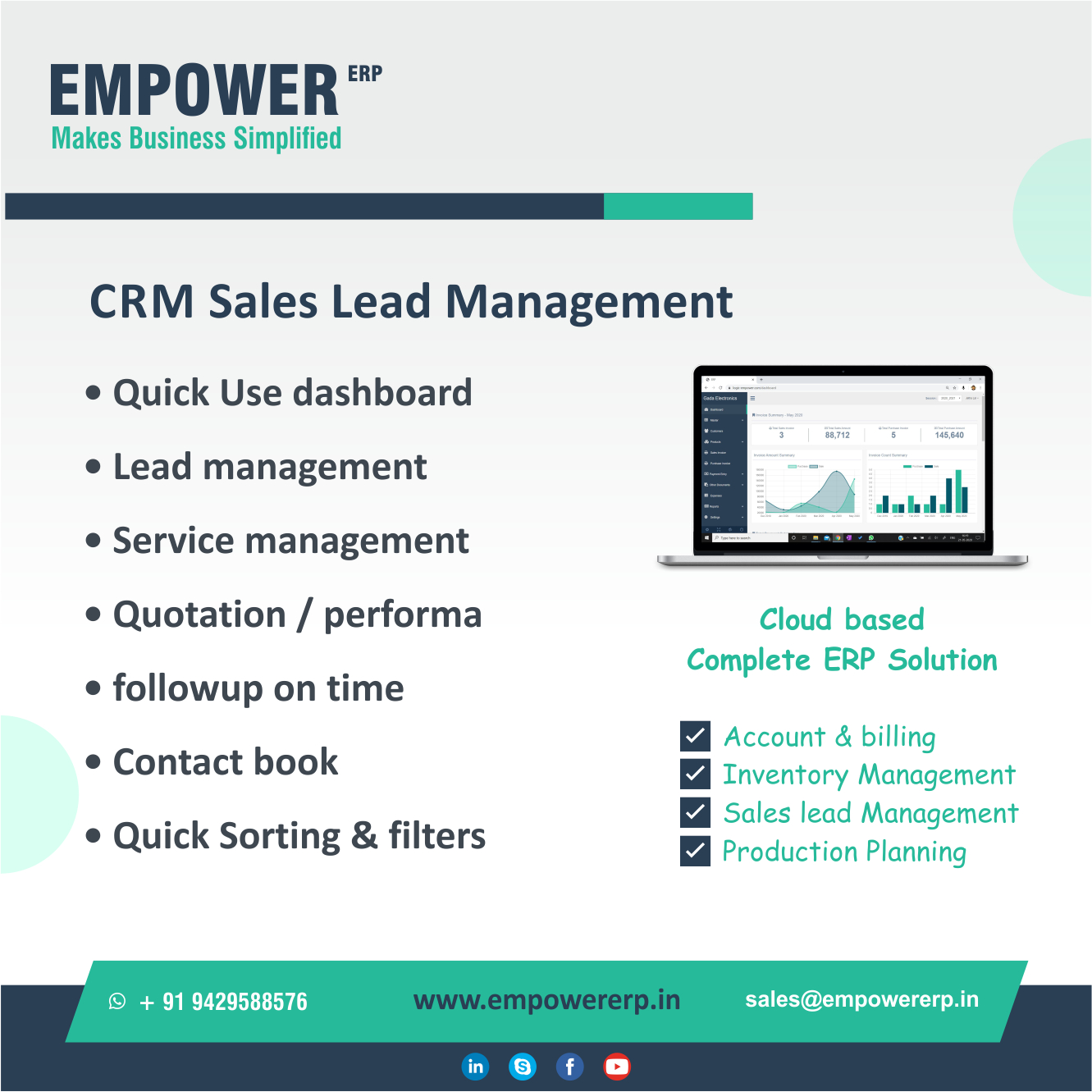
CRM software is a powerful tool designed to help businesses manage their customer relationships effectively. It serves as a centralized hub for collecting, storing, and analyzing customer information, interactions, and transactions. By leveraging CRM software, organizations can gain valuable insights into customer behavior, preferences, and history, allowing them to tailor their marketing, sales, and customer support efforts more efficiently.
Contact Management: CRM software helps you organize and manage your customer contacts, ensuring that you have accurate and up-to-date information at your fingertips.
Sales Automation: Automate repetitive sales tasks, track leads, and manage sales pipelines more effectively, leading to increased sales and revenue.
Customer Support: Provide exceptional customer support by accessing customer histories and resolving issues promptly.
Marketing Campaigns: Create targeted marketing campaigns, segment your audience, and measure campaign effectiveness to maximize ROI.
Analytics and Reporting: Gain valuable insights through data analysis, helping you make informed decisions and adjust your strategies as needed.
Implementing CRM software can provide numerous benefits to your business:
Improved Customer Satisfaction: With quick access to customer information and history, your team can provide personalized and efficient service, leading to happier customers.
Increased Sales: CRM software streamlines the sales process, helping your sales team close deals faster and more effectively.
Enhanced Productivity: Automation of tasks and workflows reduces manual effort, allowing your team to focus on high-value activities.
Better Decision-Making: Data-driven insights help you make informed decisions and adjust your strategies based on customer trends and preferences.
Cost Savings: By optimizing processes and resources, CRM software can help reduce operational costs in the long run.
Implementing CRM software can provide numerous benefits to your business:
Improved Customer Satisfaction: With quick access to customer information and history, your team can provide personalized and efficient service, leading to happier customers.
Increased Sales: CRM software streamlines the sales process, helping your sales team close deals faster and more effectively.
Enhanced Productivity: Automation of tasks and workflows reduces manual effort, allowing your team to focus on high-value activities.
Better Decision-Making: Data-driven insights help you make informed decisions and adjust your strategies based on customer trends and preferences.
Cost Savings: By optimizing processes and resources, CRM software can help reduce operational costs in the long run.
Managing sales leads effectively in EMPOWER CRM (Customer Relationship Management) software is crucial for any sales-oriented business. Here are the steps to manage sales leads efficiently using EMPOWER CRM software:
Data Entry and Lead Capture:
Start by entering lead information into your EMPOWER CRM system. This can include details such as name, contact information, source (where the lead came from), and any additional notes.
Lead Segmentation:
Categorize your leads into different segments based on criteria such as industry, location, company size, or buying stage. This segmentation helps you target your leads more effectively.
Lead Scoring:
Implement a lead scoring system to prioritize leads based on their potential to convert into customers. Assign scores to leads based on criteria like engagement level, budget, or fit with your ideal customer profile.
Lead Assignment:
Assign leads to specific sales representatives or teams based on their expertise or workload. Automated lead assignment rules can help distribute leads fairly.
Communication and Follow-up:
Use EMPOWER CRM software to track all interactions with leads, including calls, emails, meetings, and notes. This ensures that your team is well-informed about the lead’s history when they reach out.
Lead Qualification:
Regularly review and qualify leads to determine if they meet your criteria for a sales opportunity. This step ensures that your sales team focuses on high-potential leads.
Lead Conversion:
When a lead shows strong interest and meets the criteria, convert them into a sales opportunity or account within your EMPOWER CRM software.
Pipeline Management:
Visualize your sales pipeline within the EMPOWER CRM to track the progress of leads through various stages of the sales process, from initial contact to closing the deal.
Sales Forecasting:
Use the data in your EMPOWER CRM to make accurate sales forecasts. This can help with resource allocation, goal setting, and planning.
Regular Updates and Maintenance:
Keep your EMPOWER CRM data up-to-date. Regularly clean and validate lead information to ensure accuracy and relevance.
Training and Support:
Provide training and support to your sales team so they can effectively use the EMPOWER CRM software. Address any questions or issues promptly.
Continuous Improvement:
Continuously evaluate and improve your lead management processes. Adapt your strategies based on data and feedback to maximize your sales success.
Effective lead management in EMPOWER CRM software not only helps you close more deals but also enhances the overall customer experience. It allows your sales team to work efficiently, prioritize their efforts, and build meaningful relationships with potential customers.
✅ Unique Dashboard
✅ Today’s Task, Pending leads shows on Dashboard
✅ Create customer & Contacts
✅ Create customer category & group to filter them as required
✅ Entry of sales lead and manage it till won
✅ Entry of service call and manage it till solved
✅ Multiple user access
✅ Create proforma invoice & quotation
✅ Enter multiple logs of discussion done with customer
✅ Give your client smooth experience during buying
✅ Remove communication gap in sales team
✅ Never miss any inquiry / Sales lead
✅ Helps to do easy & quickly sales review meeting
✅ Helps you manage all service calls





